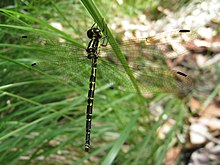Synthemistidae
Appearance
| Synthemistidae | |
|---|---|

| |
| Choristhemis flavoterminata | |
| Scientific classification | |
| Domain: | Eukaryota |
| Kingdom: | Animalia |
| Phylum: | Arthropoda |
| Class: | Insecta |
| Order: | Odonata |
| Infraorder: | Anisoptera |
| Superfamily: | Libelluloidea |
| Family: | Synthemistidae Tillyard, 1911[1] |
| Genera | |
|
See text | |
The Synthemistidae are the family of dragonflies commonly known as tigertails, or sometimes called southern emeralds. This family is part of the superfamily Libelluloidea.[2][3]
Synthemistidae is an ancient dragonfly family, with some species occurring in Australia and New Guinea.[4] Most species are small in size and have narrow abdomens. Their nymphs are bottom dwellers, and resist droughts by burying themselves very deeply. Synthemistid dragonflies frequently prefer marshy areas, as well as fast-flowing streams. The family Synthemistidae is sometimes called Synthemidae.[5]
Genera
[edit]The family Synthemistidae includes the following genera:[2][6]
- Apocordulia Watson, 1980
- Archaeophya Fraser, 1959
- Archaeosynthemis Carle, 1995
- Austrocordulia Tillyard, 1909
- Austrophya Tillyard, 1909
- Austrosynthemis Carle, 1995
- Choristhemis Tillyard, 1910
- Cordulephya Selys, 1870
- Eusynthemis Förster, 1903
- Gomphomacromia Brauer, 1864
- Hesperocordulia Tillyard, 1911
- Idionyx Hagen, 1867
- Idomacromia Karsch, 1896
- Lathrocordulia Tillyard, 1911
- Lauromacromia Geijskes, 1970
- Macromidia Martin, 1907
- Micromidia Fraser, 1959
- Neocordulia Selys, 1882
- Neophya Selys, 1881
- Nesocordulia McLachlan, 1882
- Oxygastra Selys, 1870
- Parasynthemis Carle, 1995
- Pseudocordulia Tillyard, 1909
- Syncordulia Selys, 1882
- Synthemiopsis Tillyard, 1917
- Synthemis Selys, 1870
- Tonyosynthemis Theischinger, 1998
See also
[edit]References
[edit]- ^ Tillyard, R.J. (1911). "Monograph of the genus Synthemis. (Neuroptera: Odonata)". Proceedings of the Linnean Society of New South Wales. 35: 312-377 [329] – via Biodiversity Heritage Library.
- ^ a b "Family Synthemistidae". Australian Faunal Directory. Australian Biological Resources Study. 2022. Retrieved 1 September 2024.
- ^ Dijkstra, Klaas-Douwe B.; Bechly, Günter; Bybee, Seth M.; Dow, Rory A.; Dumont, Henri J.; Fleck, Günther; Garrison, Rosser W.; Hämäläinen, Matti; Kalkman, Vincent J.; Karube, Haruki; May, Michael L.; Orr, Albert G.; Paulson, Dennis R.; Rehn, Andrew C.; Theischinger, Günther; Trueman, John W.H.; Van Tol, Jan; von Ellenrieder, Natalia; Ware, Jessica (2013). "The classification and diversity of dragonflies and damselflies (Odonata). In: Zhang, Z.-Q. (Ed.) Animal Biodiversity: An Outline of Higher-level Classification and Survey of Taxonomic Richness (Addenda 2013)". Zootaxa. 3703 (1): 36–45. doi:10.11646/zootaxa.3703.1.9. hdl:10072/61365. ISSN 1175-5334.
- ^ "Synthemistidae - Tigertail Dragonflies". Brisbane Insects and Spiders. May 2013.
- ^ "Synthemidae". encyclopedia.com. Oxford University Press. 2019. Retrieved 1 September 2024.
- ^ Paulson, D.; Schorr, M.; Abbott, J.; Bota-Sierra, C.; Deliry, C.; Dijkstra, K.-D.; Lozano, F. (2024). "World Odonata List". OdonataCentral, University of Alabama.
External links
[edit]Wikimedia Commons has media related to Synthemistidae.
 Data related to Synthemistidae at Wikispecies
Data related to Synthemistidae at Wikispecies
